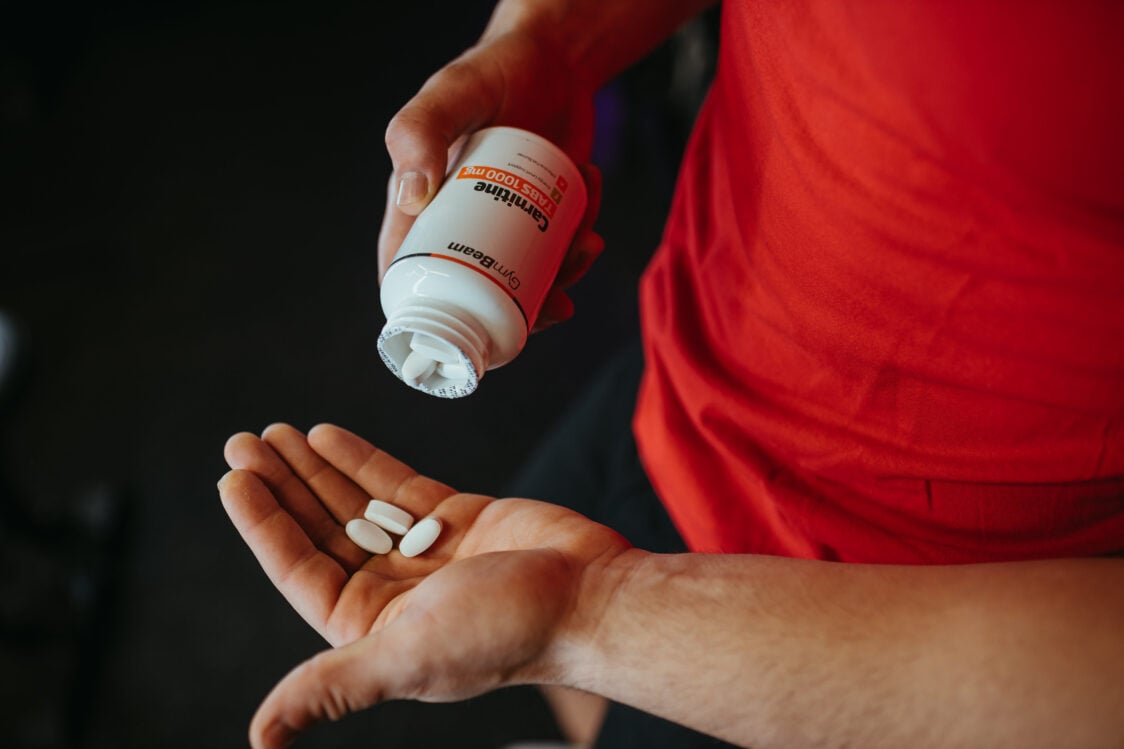Table of Contents
Does carnitine have a place of honour in your supplements stash among other products that aid with weight loss? It has truly built a reputation as an effective fat burner, promising a faster metabolism and rapid weight loss. How much truth is there to this claim, and what other effects does this substance boast?
In the article, you will learn about the impact of carnitine on these areas:
What is carnitine?
Carnitine is one of the most popular dietary supplements for weight loss, offering a helping hand in shedding excess kilos. It can be taken individually in the form of a drink, tablets, or even shots. However, it’s also commonly found in combination with other substances as part of various fat burners and weight loss supplements.
You might think of it as some kind of miraculous substance that you need to supplement in order to effectively burn fat and achieve your desired physique. However, we are about to slightly disappoint you—it’s not really some concoction made in a secret laboratory, but an amino acid that the body can naturally produce from lysine and methionine, while also storing it. Up to 98% of its total quantity in the body is stored in skeletal muscle or the cardiac muscle. The remaining roughly 2% is then found in the liver and kidneys. [7]
However, carnitine is also a common component of our diet, mainly in the form of animal-based foods. It is particularly abundant in meat and meat products, but you can also obtain it from fish, eggs, and dairy products. [18]
How much carnitine do specific foods typically contain?
| Pork ham | 449 |
| Chicken breasts | 180 |
| Chicken thigh | 63 |
| Salmon | 0.53 |
| Sardines | 0.1 |
The average Western diet, which includes meat and other animal-based products, provides us with approximately 24 to 145 mg of carnitine per day. To put this into perspective, a vegan diet that excludes all animal-based foods only provides around 1.2 mg of carnitine per day. It is worth noting that the body needs approximately 15 mg of carnitine per day for optimal function. [18]

How does carnitine function?
Carnitine has earned a reputation as an effective fat burner due to its specific role in the body. Essentially, it acts as a sort of taxi, transporting fatty acids (fat) across the border (mitochondrial membrane) into the cellular powerhouses known as mitochondria. Inside the mitochondria, fatty acids are burned to produce energy.
This is because fatty acids cannot enter mitochondria on their own and require assistance with transportation.
So when fat is released from the subcutaneous stores, such as the unwanted fat around the abdomen and thighs, Carnitine plays a role in ensuring that it is effectively burned and converted into energy. [7,18]
What forms of carnitine are there?
- L-Carnitine Base: Unlike other forms, this one is 100% pure carnitine. It is stable only in liquid form and is known for its good absorption rate.
- L-Carnitine L-Tartrate: This is a combination of pure L-Carnitine and a salt (tartrate = tartaric acid salt). It is commonly used in tablets or capsules and is believed to have a positive effect on sports performance. [3]
- Acetyl-L-Carnitine (ALCAR): This form is most commonly used when taking carnitine to support brain function. It is known to cross the blood-brain barrier, which separates the blood vessels of the brain from brain tissue, most effectively. [3]
- Glycine Propionyl-L-Carnitine (GPLC): This form is natural to skeletal muscles and the cardiac muscle. It can provide these muscle structure with energy without the presence of oxygen and is also used to produce NO (nitric oxide), which is involved in vasodilation. This allows for a greater supply of nutrients and oxygen to the working muscles for maximum sports performance. [5]
- D-Carnitine: This is an inactive form of carnitine. Moreover, it can even inhibit the formation of L-Carnitine (the active form), leading to a deficiency. It should not be used in dietary supplements because the body cannot utilize it properly.
What health effects does carnitine have?
1. It Plays a Role in Weight Loss
Carnitine is the most popular and commonly used fat burner, which accompanies many on their weight loss journey. However, it is not a miraculous weight loss pill that will tone your body and permanently rid you of the unwanted subcutaneous fat without any effort on your part. As always, the basis of weight loss lies in caloric deficit. You must consistently expend more energy than you consume. Additionally, carnitine works best in conjunction with sports activity and is well-suited for those who engage in regular exercise.
When you manage to address caloric deficit through proper nutrition and exercise, carnitine can step in and offer a helping hand. Even in studies, its impact on fat oxidation appears to be a useful ally in weight loss. This makes sense when you consider how carnitine functions in the body—it helps transport fatty acids into the mitochondria, where they are subsequently burned and converted into energy. This allows the body to utilize fat as an energy source more effectively. [14]
Scientists also suggest that carnitine’s influence on hormone-sensitive lipase plays a role in this effect. Hormone-sensitive lipase is an enzyme that breaks down subcutaneous fat in the form of triacylglycerols into glycerol and fatty acids. When it operates faster, fats are broken down more quickly and can be burned more rapidly in the cellular powerhouses (mitochondria). [2]
However, it appears to be most beneficial as an aid in weight loss when the initial level of carnitine is low. [19]
How to get the most out of the effects of carnitine? It should be accompanied by a well-structured diet in order to achieve weight loss, which our online calculator for energy intake and macronutrients can assist you with.
You might be interested in these products:
2. It Influences Brain Function and Memory
Carnitine is also recognized for its impact on brain performance and cognitive functions, including memory and concentration. This effect is connected with Acetyl-L-Carnitine (ALCAR) in particular, as it has the ability to more efficiently cross the blood-brain barrier from the bloodstream into brain tissue. Inside brain cells, it functions in a manner akin to its role in muscle cells, providing the necessary components for energy production. This can result in enhanced mental performance. [18]
Scientists also suggest that carnitine may play a role in the production of the neurotransmitter acetylcholine, which functions as a messenger between nerve cells (neurons). Therefore, carnitine, by influencing its production, could potentially support cognitive functions. This effect is often studied in individuals with Alzheimer’s disease. This condition is characterized not only by the accumulation of amyloid plaques (clumps of insoluble proteins in the brain) but also by damage to nerve cells in the brain that utilize the aforementioned acetylcholine. If this neurotransmitter was produced at higher levels, it could potentially offset the reduced number of functional neurons. For example, studies indicate that the use of carnitine has a positive impact on memory in individuals with Alzheimer’s disease. [18]
Thanks to its effect on brain performance, carnitine is classified among healthy ageing supplements that can contribute to ageing gracefully. It also falls into the category of nootropics, which are known for their influence on memory, learning, and other cognitive functions.
- Have a look at other ways to take care of not just brain health but your entire body as well as how to age healthily in the article: Anti-ageing and Healthy Ageing: How to Take Care of Your Body and Maintain Your Health and Youthful Appearance?
- What are nootropics, how do they work, and which ones are the best? You can find out more in the article: Nootropics: Substances to Improve Concentration and Memory. Which Are the Best?

3. It Has a Positive Effect on Heart Health
As mentioned earlier, carnitine is also crucial for the heart. Fatty acids are a favoured source of energy for cardiac muscle cells. Therefore, it is particularly advantageous for the heart when carnitine assists in transporting fatty acids into the mitochondria, where they can be converted into energy. Moreover, carnitine seems to play a role in removing toxic by-products that accumulate during the biochemical processes of metabolism. [4,8]
It’s interesting that, based on some studies, carnitine may also help support the function of the heart that was afflicted by conditions like heart attacks or other forms of ischaemia (lack of blood supply). This is because carnitine levels tend to be low after these cardiac events, and supplementing this substance could have a positive impact on heart function. However, these potential effects appear to manifest in doses of at least 2 grams per day, ideally 6 to 9 grams per day. [4,5]
Heart health is also influenced by other substances, like the beneficial omega-3 fatty acids. You can discover more about them in the article: What Quantity of Healthy Fats Should You Eat? The Amount of Omega-3 Is More Important Than Its Ratio to Omega-6
Discover our bestsellers:
4. It Affects Sports Performance
Research also points to the potential impact of carnitine on sports performance. The studies vary in their results, but the focus has been on the following areas of sports performance:
- Improved post-exercise recovery may be related to supporting muscle oxygenation. This aids in recovery after anaerobic activity, i.e. intense activity during which muscles are not supplied with oxygen, such as strength training in the gym or sprinting. [19]
- More efficient muscle oxygenation also occurs thanks to the aforementioned production of nitric oxide. This leads to greater dilation of blood vessels in the muscles, allowing for a higher supply of oxygen and nutrients. Consequently, muscles can more effectively eliminate lactate. [19]
- Support of the production of muscle glycogen reserves.
- Greater strength and performance during intense activities are attributed to the increased availability of carnitine. It appears that during these activities, carnitine is naturally less available in the mitochondria. [11]
Carnitine has many promising effects on sports performance. However, further research is needed to confirm whether carnitine indeed functions in this manner.
There are also other intriguing substances that can enhance sports performance. If that’s your goal, you might find the article “How to Choose and Use the Most Effective Pre-workout Supplement?” interesting.

5. It Affects Blood Sugar Levels
Some studies indicate a positive impact of carnitine on elevated glycaemia (blood sugar levels) and insulin resistance (IR). These two factors are related because with IR, insulin can’t efficiently transport sugar (glucose) from the blood into cells, resulting in elevated blood sugar levels.
Some studies suggest that the development of insulin resistance could be influenced, among other factors, by dysfunctional processes in the mitochondria of muscle cells. This can lead to disruptions in the breakdown of fatty acids and their accumulation, promoting the onset of insulin resistance. IR also appears to be associated with low levels of carnitine. This is where carnitine supplementation comes into play, as it might help raise carnitine levels back to an optimal range, thereby supporting the process of fatty acid oxidation. [1,16]
An excellent way to improve insulin resistance is through exercise. You can learn more about its other benefits in the article: Why Should You Exercise? Stronger Immunity, Heart Health and 8 Other Reasons
6. It Affects Fertility
When talking about carnitine, its effect on both male and female fertility is also mentioned. Studies describe the impact of carnitine on sperm production, maturation, and motility (mobility) in men. In women, its influence on fertility is observed, especially in those suffering from Polycystic Ovary Syndrome (PCOS), which is typically associated with infertility.
For example, one study followed 170 women with this syndrome from the time they started taking carnitine or a placebo until they had their first positive pregnancy test. It was found that in the group taking 3 grams of carnitine daily, there was a higher number of successful pregnancies. [6]
A comprehensive study focusing on male fertility concluded that supplementation with 2–3 grams of carnitine daily for six months had a positive impact on sperm concentration and morphology (structure). [13]
- Are you interested in learning about other nutrients important for women’s health? Then read our article: Women & Nutrition: The Most Important Vitamins and Minerals for Health and Beauty
- To learn more about the nutritional needs of the male body, check out our article: Men & Nutrition: The Most Important Vitamins and Minerals for Health, Testosterone and Performance

7. What Other Areas of Health Does carnitine Impact?
Carnitine is also being studied in connection with other health benefits. Where could its promising benefits come in handy?
- Antioxidant Activity: Studies point to the antioxidant properties of carnitine. Antioxidants help combat free radicals that arise from oxidative stress, thus reducing the risk of various diseases. [12]
- Osteoarthritis (a degenerative joint disease): According to some studies, Carnitine reduces the levels of C-reactive protein, which is an inflammation marker. Additionally, it appears to be associated with a substance called malondialdehyde, which leads to pain and limited mobility in people with this condition. Carnitine may thus play a role in joint care and serve as a joint supplement in this regard.
- Depression: Some studies have shown that acetyl-L-carnitine reduced the occurrence of the symptoms of depression. It is not entirely clear how it works, but one of the mechanisms is likely to be its impact on increasing the levels of serotonin (also known as the happiness hormone), which is often decreased in people suffering from depression. [15]
Can You Suffer From Carnitine Deficiency?
A typical healthy person usually has enough carnitine in their body. Even if their levels are not optimal, it often doesn’t lead to a deficiency that would result in significant health problems. Deficiencies typically occur in specific medical conditions or with significantly reduced dietary intake.
- Primary Carnitine Deficiency: This is a genetically inherited disorder characterized by a disrupted carnitine metabolism. The body lacks enzymes involved in the production and function of carnitine, leading to severe health problems.
- Secondary Carnitine Deficiency: This occurs as a result of diseases or conditions that lead to reduced production of carnitine in the body or increased excretion of carnitine. It can be caused by conditions such as kidney disease, for example.
- Nutritionally Induced Carnitine Deficiency: This deficiency is caused by poor absorption of carnitine in the digestive tract or a low dietary intake of carnitine. It can occur in various malabsorption disorders (which result in reduced absorption of nutrients from the intestines into the blood), malnutrition, or in alternative dietary approaches that exclude animal-based products, such as veganism.
Primary and secondary deficiencies are rare but pose serious health risks. They can lead to conditions such as severe epilepsy, hypoglycaemia, muscle dysfunction, heart issues, or nervous system disorders.
However, a healthy individual can also induce a deficiency of carnitine, primarily by severely restricting it in their diet. This most commonly occurs in various forms of veganism, where animal-based products, the primary source of carnitine, are excluded. In a typical diet, though, the intake of carnitine is typically sufficient, and there is usually no need to worry about a deficiency that could jeopardize health.
However, if carnitine stores in the body are mildly reduced or if it is not consumed in sufficient amounts, studies suggest that supplementation could provide the health benefits mentioned earlier. This is due to increasing its stores back to optimal levels.
Can Carnitine Have Side Effects?
Carnitine is not known to cause or have many side effects, but excessive intake can lead to digestive problems. These may include nausea, cramps, vomiting, or diarrhoea. However, these unwanted effects are typically associated with higher doses, typically at least 3 grams per day. [18]
Taking carnitine is also associated with heightened levels of trimethylamine-N-oxide (TMAO). This is a substance formed by bacteria after coming into contact with animal-based foods containing carnitine, choline, and other substances. Elevated levels of TMAO are linked to an increased risk of atherosclerosis (hardening of the arteries) and kidney disease. It appears that this substance may be a risk factor, especially for people who consume excessive amounts of animal-based foods. [10,18]
You can find more detailed information about the safety of taking carnitine in the article: Is Carnitine Safe?
How to Take Carnitine?
The doses of carnitine used in research studies often range from around 3 grams per day or more, especially when investigating its impact on cardiovascular health. However, in dietary supplements, the typical range is 500 to 2000 mg, which is a dose that is unlikely to cause the digestive problems mentioned earlier.
This daily dose concerns the pure form of carnitine. If you wanted to take one of its other forms, the recommended daily doses considered equivalent are as follows:
- Acetyl-L-Carnitine: 630 – 2500 mg
- L-Carnitine L-Tartrate: 1000 – 4000 mg in powder or tablet form
- Propionyl-L-Carnitine: 1000 – 4000 mg [19]

What to Combine Carnitine With?
The substances to combine with carnitine will depend on what you expect to achieve from this supplementation.
- When it comes to weight loss, you should consider combining it with other fat burners like caffeine, synephrine, or even green tea extract with EGCG content. These substances can be combined for better effectiveness, creating an efficient fat burner.
- To enhance performance and aid in muscle recovery and muscle blood supply, you can consider combining it with substances like beta-alanine, citrulline, or arginine, for example.
- If you are looking to support brain function, you can choose from a wide range of nootropics. Comprehensive supplements may combine ingredients such as CDP-choline, ginkgo biloba, or DMAE, for example.
- You can find information on how to navigate dietary supplements for weight loss and which ones are effective in the article: Dietary Supplements for Weight Loss: Which Ones Are Good for Burning Fat or Feeling of Satiety?
- The article “How to Choose the Most Effective Fat Burner, and How to Use It?” will help you with choosing and using the most effective fat burner.
What Are the Main Takeaways?
Carnitine is most commonly associated with various fat burners and dietary supplements designed to support weight loss. However, its less-familiar forms have demonstrated potential effects on brain and heart function. Although research on carnitine is still ongoing, we can now say that, in conjunction with other substances, it may serve as a beneficial aid not only for burning fat and enhancing sports performance, but also in other areas of health.
Has the article provided you with something new and interesting? If so, then be sure to share it with your friends and family!
[1] ADEVA-ANDANY, M.M. et al. Significance of l-carnitine for human health. – https://pubmed.ncbi.nlm.nih.gov/28653367/
[2] ASKARPOUR, M. et al. Beneficial effects of l-carnitine supplementation for weight management in overweight and obese adults: An updated systematic review and dose-response meta-analysis of randomized controlled trials. – https://pubmed.ncbi.nlm.nih.gov/31743774/
[3] DAMIANOU, A. L-Carnitine Research Analysis. – https://examine.com/supplements/carnitine/
[4] DINICOLANTONIO, J.J. et al. L-Carnitine in the Secondary Prevention of Cardiovascular Disease: Systematic Review and Meta-analysis. – https://www.mayoclinicproceedings.org/article/S0025-6196%2813%2900127-4/fulltext
[5] FERRARI, R. et al. Therapeutic Effects of l-Carnitine and Propionyl-l-carnitine on Cardiovascular Diseases: A Review. – https://onlinelibrary.wiley.com/doi/abs/10.1196/annals.1320.007
[6] ISMAIL, A.M. et al. Adding L-carnitine to clomiphene resistant PCOS women improves the quality of ovulation and the pregnancy rate. A randomized clinical trial. – https://pubmed.ncbi.nlm.nih.gov/25015747/
[7] JEUKENDRUP, A.E. - RANDELL, R. Fat burners: nutrition supplements that increase fat metabolism. – https://onlinelibrary.wiley.com/doi/abs/10.1111/j.1467-789X.2011.00908.x
[8] KODDE, I.F. et al. Metabolic and genetic regulation of cardiac energy substrate preference. – https://pubmed.ncbi.nlm.nih.gov/17081788/
[9] KULCZYŃSKI, B. et al. Characteristics of Selected Antioxidative and Bioactive Compounds in Meat and Animal Origin Products. – https://www.ncbi.nlm.nih.gov/pmc/articles/PMC6769838/
[11] MIELGO-AYUSO, J. et al. Effect of Acute and Chronic Oral l-Carnitine Supplementation on Exercise Performance Based on the Exercise Intensity: A Systematic Review. – https://www.ncbi.nlm.nih.gov/pmc/articles/PMC8704793/
[12] NACHVAK, S.M. et al. L-Carnitine supplementation reduces biomarkers of inflammatory and oxidative stress in patients with coronary artery disease: a randomised controlled trial. – https://pubmed.ncbi.nlm.nih.gov/32816578/
[13] SALAS-HUETOS, A. et al. The Effect of Nutrients and Dietary Supplements on Sperm Quality Parameters: A Systematic Review and Meta-Analysis of Randomized Clinical Trials. – https://www.ncbi.nlm.nih.gov/pmc/articles/PMC6247182/
[14] TALENEZHAD, N. et al. Effects of l-carnitine supplementation on weight loss and body composition: A systematic review and meta-analysis of 37 randomized controlled clinical trials with dose-response analysis. – https://pubmed.ncbi.nlm.nih.gov/32359762/
[15] VERONESE, N. et al. Acetyl-L-Carnitine Supplementation and the Treatment of Depressive Symptoms: A Systematic Review and Meta-Analysis. – https://pubmed.ncbi.nlm.nih.gov/29076953/
[16] Can L-carnitine improve glycemic control? - Study Summary - Examine. – https://examine.com/research-feed/study/dGrzm9/
[17] NUTRITIONAL SUPPLEMENTS AND METABOLIC SYNDROME - ScienceDirect. – https://www.sciencedirect.com/science/article/abs/pii/B9780123742407500127
[18] Office of Dietary Supplements - Carnitine. – https://ods.od.nih.gov/factsheets/Carnitine-HealthProfessional/
[19] Research Breakdown on L-Carnitine - Examine. – https://examine.com/supplements/carnitine/research/#plqYNl6-cardiovascular-health


Add a comment